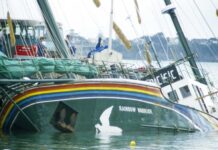So here we are, on the eve of a New Year in the early 21st century, peering into the future with what increasingly looks like a crippling lack of curiosity.
Given the widespread demographics on this scrap of an island at the stormy end of the South Pacific, we on Waiheke are not immune from the vagaries of geopolitics and power in a time of predatory oligarchs, seemingly universal armament, rampant disinformation and extreme wealth.
The bad news at the end of an undeniably right-wing year under a coalition government that borders on rank cruelty to a large majority of its taxpayers and their families really shouldn’t be swept under the carpet.
It is sinful for the Prime Minister to be lamenting our lack of ‘productivity’ on the eve of Christmas after a year of job losses, swingeing mortgages and extortionate inflation on food and vegetables.
How can whole towns live if their major industry has closed down, largely because of electricity pricing and shortages hitting local manufacturing? (While the foreign-controlled Tiwai Point aluminium smelter gets continuous electric power at one quarter the price paid by private New Zealand consumers, thanks to the coalition government’s grace and favour).
It is insulting to ask us to accept that it’s all the fault of some left-wing decision five years ago in the face of a global pandemic that we weathered exceptionally well.
Not least because communities like Waiheke, which retain a remnant of the country’s ‘nation of small businesses’ ethos, know that the money spent by Jacinda Ardern’s government saved our businesses, staff and communities.
We had already seen how bad the GFC had been, mainly because there was no money in circulation to keep people alive and functional. Our coalition government could learn something here.
To corporate high fliers with no skin in the game, we as taxpayers might seem merely bovine, but good farmers win or lose their shirt on their ability to get the most productive best from the land, balanced against a sustainable future.
Our current helplessness, I think, started five years ago at the start of the Covid years. NZME chief executive Michael Boggs promised all New Zealanders that the company’s publications and radio stations would uphold the “highest standards of journalism” during the pandemic.
Despite that promise, and the corporate billing that this was, “the vital news you need to know, here and now”, Newstalk ZB’s Mike Hosking remains memorable for having used the pandemic to see how fast he could oscillate from opinion to contradictory opinion.
‘Coronavirus hysteria is out of control’ was Hosking’s headline in early March, 2020. Covid was no big deal. It wasn’t a “killer virus” but merely a “virus that can kill”.
Then came: ‘No need for coronavirus economic panic’, he said, “these are tough, uncertain days, but they’re still early days. Holding your nerve is a skill, hopefully not missing in this government.”
Just over a week later, the man who urged the government to hold its nerve had been replaced by one who couldn’t understand why it hadn’t acted faster.
“The fact it isn’t is yet another example of a government that has been caught in too many meetings, and doesn’t know how to be bold. You don’t close your country on Saturday and tell us to wait three days to be told how the economic gaps are to be filled,” Hosking wrote.
By 23 March, he was calling for the government to put the country into lockdown to deal with the spread of the virus, returning on April 1 to his original point: our fears over coronavirus are overblown. From criticising the government for not pushing the country into lockdown fast enough, he went back to saying it was an overreaction to put the country into lockdown.
An interview with an epidemiologist had Hosking downplaying the danger posed by Covid-19, because most of the people it killed were sick or elderly and may have died anyway of different causes. “Something was going to get them.”
The subsequent unbridled muddle deafened us for the next five years in New Zealand politics and is out there again for a late airing at the end of our government’s first year, the bloody axe visible in the background. Millions have been squandered on knee-jerk responses to anything the previous government had touched. No matter that it had been elected by a far larger majority and helped rather than harmed.
New Zealand has always been something of a test case for international trends and capitalism itself, right from the 1980s when Richard Prebble sold the country’s railways for a song and weeds engulfed freight rail tracks that had built thriving provincial towns and a rather fine little country.
Small enough to be allowed to fail, it has sometimes seemed, looking back.
Lost to what we would now call an oligarchy, carved out by Richard Prebble, Rogernomics and Ruth Richardson.
Our egalitarian view of ourselves has never recovered, the news out of Wellington has seldom been more specious. It’s clear, we are on our own in this.
• Liz Waters
© Waiheke Gulf News Ltd 2024






